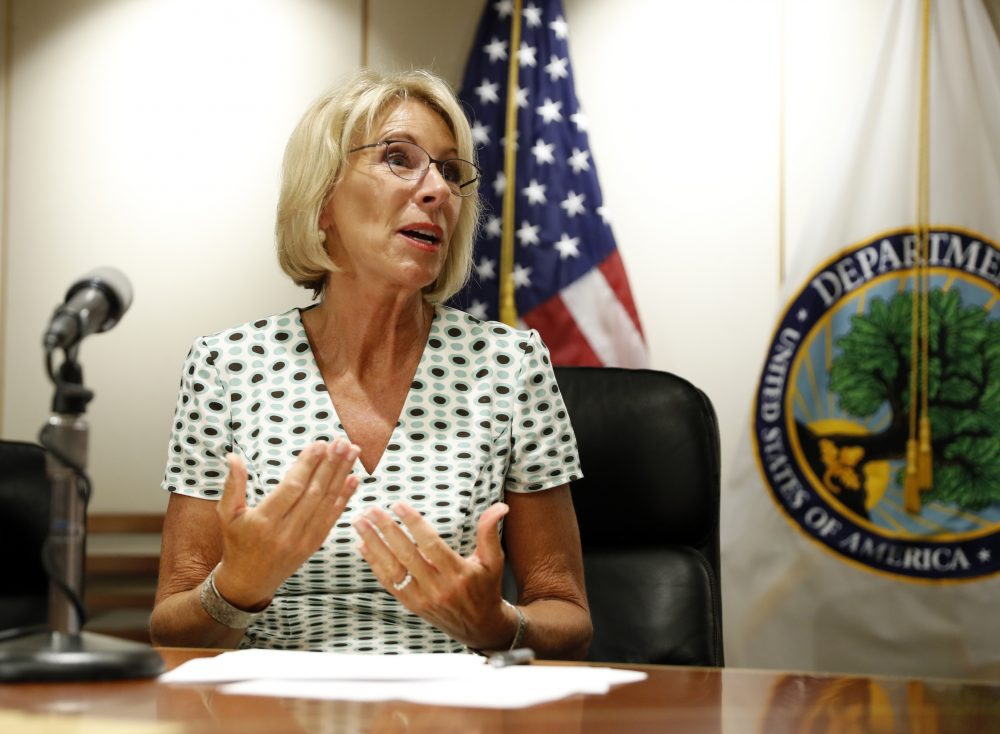Advertisement
How Betsy DeVos Is Reshaping Federal Education Policy

Education Secretary Betsy DeVos has made headlines recently for plans to further shake up policies regarding for-profit higher education.
She's proposed a new rule that critics say would make it harder for defrauded students to seek debt relief. She's also taken aim at so-called gainful employment regulations put into place by the Obama administration, which forced for-profit schools to prove students they enrolled were able to secure decent jobs.
It's a fitting time for a step back to look at DeVos' impact so far and the trajectory for education in the country under her watch.
The recent regulation proposals fit squarely with DeVos' track record on policy. The constant theme: deregulation.
"She really believes government should not be telling you where to be going to school," Wall Street Journal reporter Michelle Hackman said. "They should be giving you as many options as possible and sort of allowing the market to help you decide, or giving you information to help you decide where you would best benefit from."
The rules on record from the Obama administration were designed to protect students from schools like ITT Technical Institute and Corinthian Colleges, which were found to be misleading students with false advertising and misleading claims.
"The schools were saying, 'If you go through this program, you have a 99 percent guarantee of getting a job,' " Hackman said. "And students were enrolling, and taking on huge amounts of debts, and those things were just turning out to be flatly not true."
DeVos' actions to dial back the gainful employment regulations have led to lawsuits by a host of attorneys general across the country.
Advertisement
Among them: Massachusetts' Maura Healey.
"Unfortunately, as another example of the terribly misguided policies and detrimental policies of Betsy DeVos, she came in and basically rolled back that rule that was there to protect us, and we took to the courts," Healey said.
The other notable rule DeVos has laid out deals with loan forgiveness. Right now, if you were a student at an institution closed or accused of fraud, you might be eligible for student loan relief. Under DeVos' plan, students would no longer receive that help automatically, and could possibly be ineligible for any relief if the former school provided an option to complete the degree elsewhere.
This new policy would reportedly save the government $12.7 billion over 10 years.
"The money on the line is taxpayer money that these students are taking on, and forgiving all of it sort of willy-nilly is really going to cost taxpayers hundreds of millions, if not billions, of dollars," Hackman said of the argument in favor of DeVos' policy change.
For some, DeVos' approach to policy thus far has resonated. Her messaging, however, has been flawed.
"I think that she is taking the federal government's role in a more modest and, quite frankly, productive direction," said Max Eden, senior fellow at the Manhattan Institute. "Unfortunately, the things that she is doing require a lot of finesse and explanation, and kind of power of persuasion that she hasn't quite been able to muster."
Critics of DeVos, however, have pointed to improper handling of civil rights complaints to the Department of Education. The NAACP, the National Federation of the Blind and the Council of Parent Attorneys and Advocates filed a lawsuit recently alleging the department may be "unlawfully dismissing complaints even if students or their families provide ample proof of discrimination," the Washington Post reported.
"The department rolled back many of the civil rights enforcement regulations we thought were crucial to making sure that every American — regardless of race, ethnicity, points of national origin or any other differences, even disability — would have an opportunity to get a high-quality education," said Hilary Shelton, senior vice president for advocacy and policy at the NAACP and director to the NAACP's Washington Bureau.
